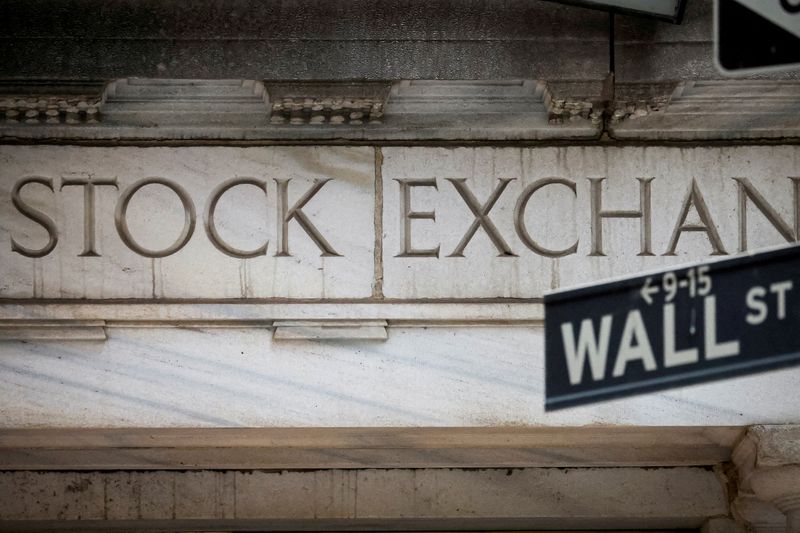By Lewis Krauskopf
NEW YORK (Reuters) - Investors are relying on an old strategy to navigate the current tumult in asset prices: buying shares of the massive U.S. companies that led markets higher for years.
Shares of the top five companies by market value -- Apple (NASDAQ:AAPL), Microsoft (NASDAQ:MSFT), Alphabet (NASDAQ:GOOGL), Amazon (NASDAQ:AMZN) and Nvidia -- have gained between 4.5% and 12% since March 8, when troubles at Silicon Valley Bank set off banking system worries. In that period, the S&P 500 has fallen 0.5%.
Megagaps are attracting bets because of strong balance sheets, robust profit margins and business models expected to hold up better if recession hits, investors said. A recent pullback in U.S. bond yields, whose ascent punished growth stocks last year, is also buoying their prices in 2023.
But their strength could have drawbacks. Megacaps' growing market capitalization means indexes such as the S&P 500 are increasingly driven by a smaller cluster of stocks. That could spur volatility in broader markets if circumstances change and investors make a quick exit from big tech and growth names.
"The view from investors is that technology companies are in a better place to get through an uncertain period of time,” said Keith Lerner, co-chief investment officer at Truist Advisory Services, which is overweight the tech sector. However, “when you have crowding you could see a sharp reversal out of nowhere because everyone is in the same area.”
Strength in megacaps also cloaks weakness elsewhere. Measures of market breadth have turned more negative, while the equal-weighted S&P 500, a proxy for the average stock in the benchmark index, is down over 5% since March.
Investors are bracing for more banking sector volatility next week, after sharp declines in shares of European giants Deutsche Bank (ETR:DBKGn) and UBS on Friday followed the collapse of Silicon Valley Bank and Signature Bank earlier this month. Upcoming U.S. data on consumer confidence and inflation could also sway markets.
GRAPHIC: Big stocks beat the market https://www.reuters.com/graphics/USA-STOCKS/WEEKAHEAD/akveqejezvr/chart.png
Megacaps led the U.S. market in the decade following the financial crisis and spearheaded Wall Street's blistering rebound after the selloff in early 2020 fueled by the coronavirus pandemic. But they tumbled last year, as the Federal Reserve raised interest rates to fight 40-year high inflation.
Their rebound this year accelerated as concerns over the banking system spiked, and the combined weight of Apple and Microsoft in the S&P 500 recently topped 13%. That was the highest in over 30 years for any top two stocks in the index, according to Todd Sohn, technical strategist at Strategas.
The weight of the top five S&P 500 companies has rebounded to 21.7% from 18.8% for the top five stocks at the end of 2022.
GRAPHIC: Megacap stocks' weight in S&P 500 https://fingfx.thomsonreuters.com/gfx/mkt/zdvxdqjxbvx/Pasted%20image%201679681379839.png
As megacaps have rallied, some indicators of breadth, which technical analysts view as gauges of broad market health, have darkened recently.
The number of new 52-week lows on the New York Stock Exchange and Nasdaq was on pace to eclipse new highs for three straight weeks, a reversal after new highs had topped new lows almost every week to start 2023, according to Willie Delwiche, investment strategist at Hi Mount Research.
Further, the percentage of industry groups tracked by Delwiche above their 10-week moving averages has plummeted from 87% in early February to 7% in the latest week.
“After some hopeful signs earlier this year, it’s evidence that the pattern of weakness beneath the surface that we saw last year is re-emerging,” Delwiche said. “We need to see better participation if the indexes are going to be able to sustain the next leg higher.”
The performance of megacaps could suffer if banking worries ease and investors scoop up economically sensitive stocks that have struggled. The S&P 500 energy sector is down 7.5% since March 8, while the industrials sector is off 5%.
A rebound in U.S. bond yields could pressure tech and growth stocks. Earnings growth in the tech sector, meanwhile, is expected to trail the overall S&P 500 in 2023.
Nevertheless, some investors are bullish on megacap stocks.

Despite last year's market swoon, "our bias has been that we think we are still in ... an up trend," said Thomas Martin, senior portfolio manager at GLOBALT Investments, who is overweight many megacaps.
In turn, he said, that likely means "the big-cap growth stocks will be the ones who lead from here."